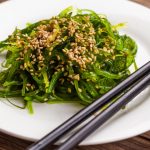How a unique compound in seaweed fights cancer and prevents metastasis
 (NaturalHealth365) Japan has some of the longest life expectancy averages in the world and some of the lowest incidences of chronic diseases common in the western world. One of the most critical factors to their good health is the regular consumption of seaweed, rich in a compound known as fucoidan.
(NaturalHealth365) Japan has some of the longest life expectancy averages in the world and some of the lowest incidences of chronic diseases common in the western world. One of the most critical factors to their good health is the regular consumption of seaweed, rich in a compound known as fucoidan.
Fucoidan has been the subject of over 1,000 studies and is known to have several health benefits, from suppressing inflammation to promoting immunity. However, one of the most encouraging effects of fucoidan is its ability to slow the spread of cancer.
Fucoidan inhibits cancer cell movement, studies suggest
Fucoidan is the general term applied to a group of molecules that can be extracted from several seaweed species, although wakame (Undaria pinnatifida) is perhaps the most well-known source. Numerous scientific studies have shown that this unique seaweed compound can stop cancer cells from spreading throughout the body by inhibiting molecules known as selectins.
The primary function of selectins is to facilitate the physical interaction and movement of various types of cells. The problem, however, is that cancer cells can take advantage of these molecules in spreading throughout the body. But fucoidan has been shown to prevent cancer cells from adhering to blood vessel walls and spreading.
Avoiding the dangers of metastasis
The spread of cancer cells, or cancer metastasis, often leads to deadly complications for cancer patients. While an initial cancerous tumor is dangerous and often life-threatening in itself, the spreading of this cancer to distant areas of the body through metastasis is often the cause of cancer recurrence and all too frequently leads to death.
Metastasis is dangerous because cancer cells have the ability to float around in the bloodstream, often causing secondary tumors to get a start before the primary tumor is even discovered. This makes it vital that steps be taken to prevent metastases on an everyday basis without waiting for a cancer diagnosis.
Seaweed compound offers cumulative preventive effects
Studies have shown fucoidan’s cancer-preventive abilities extend beyond the effects involving selectins, resulting in a cumulative effect on cancer cells. For example, it is known that fucoidan can inhibit protein-melting enzymes typically used by cancer cells to force their way into tissues after traveling through the bloodstream. It can also inhibit the spread of cancer by preventing new blood vessel growth and reducing the viability of cancer cells.
Fucoidan also works to prevent cancer by slowing the proliferation of cancer cells and inducing programmed cell death in cancer cells. These cumulative effects of fucoidan have been demonstrated in a number of animal studies.
For example, in an animal study, the animals were injected with human lung cancer cells and administered a fucoidan supplement. The supplement prevented the spread of cancer throughout the lungs while also preventing the expected weight loss that often weakens cancer patients.
If you’re looking to eat more sea vegetables (seaweed), try adding some wakame into a miso soup or simply adding a small piece of kombu into your next soup or bean dish. It’s a delicious way to increase your mineral intake.
In a similar model, fucoidan supplementation prevented the spread of a highly invasive and metastatic form of liver cancer. A rat study yielded similar results. Animals were injected with human colon cancer cells, but fucoidan supplementation prevented the adhesion of malignant cells to lung capillaries by more than 50 percent.
Overall, this powerful seaweed compound helps fight cancer early on by boosting the immune system. Not only is this key to the prevention of cancer, but it reduces the normal diminishing effects that aging has on the immune system.
Discover the best ways to avoid the threat of cancer: Own the Stop Cancer Docu-Class, an online, educational program created by Jonathan Landsman.
Sources for this article include:



